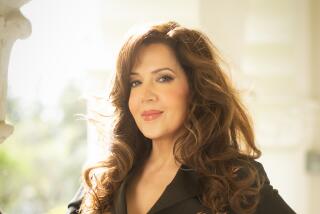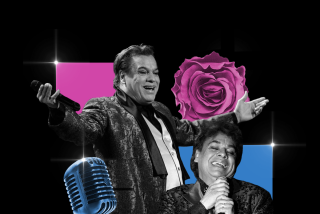CLOSE-UP
Maria Laria, the Cuban-born hostess and producer of Telemundo Network’s “Cara a Cara” (“Face to Face”), is being touted as the “Spanish-speaking Oprah Winfrey.” “Geralda” would be a lot more like it.
Turn to the 50-plus regions of your TV dial at 11:30 p.m., and you’ll find Laria tickety-ticking in stiletto heels, fearlessly cross-examining curanderos (witch doctors), wildly bereaving adulterees or tummy-tuck experts. “(Oprah’s) not my favorite,” says Laria, struggling to be diplomatic. “What I don’t like about her is that she includes her own life in the show too much. On ‘Cara a Cara,’ the star of the show is not me but whomever I’m interviewing--whether it be (former Nicaraguan) President Daniel Ortega or a homosexual.”
“Cara a Cara” used to be Los Angeles’ own late-night jewel. But last year, the 3-year-old program went national. Now the entire country can tune in and groove on the pro-wrestlers, white supremacists and transsexuals who end up on Laria’s fishpond-sized stage. (Those who don’t understand the language will find the visual circus entertainment enough. But one episode cried out for comprehension: Laria caught in a marital spat that climaxed with the wife storming off stage and Laria sweet-talking her back to the show’s overstuffed turquoise couch.)
Laria’s preparation for airwaves fame began 13 years ago when she lucked into a job chatting up celebrities on a community-access station in Los Angeles. By 1987, she was co-anchoring Telemundo’s nightly news and hosting “Cara a Cara,” the first U.S.-based Spanish-speaking panel-discussion show.
Knowing what her viewers like, Laria, a four-time Emmy nominee, schedules spicy segments, although she prefers the more “serious”-themed shows (politics, immigration, et cetera). But the discussions of taboo topics are more than ratings-generators. “The Hispanic community is very traditional,” she says. “They never talk about sex, never argue openly; everybody is polite. They just hide everything underneath. Mothers don’t even explain anything to their daughters when they have their first period. At least 75% of the time, I am trying to educate. Sometimes you settle for entertainment.”
More to Read
The complete guide to home viewing
Get Screen Gab for everything about the TV shows and streaming movies everyone’s talking about.
You may occasionally receive promotional content from the Los Angeles Times.






